Related Research Articles
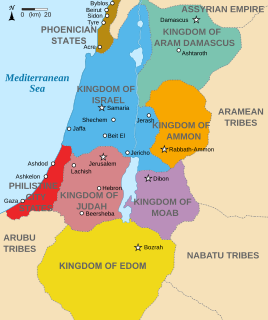
Ammon was an ancient Semitic-speaking nation occupying the east of the Jordan River, between the torrent valleys of Arnon and Jabbok, in present-day Jordan. The chief city of the country was Rabbah or Rabbat Ammon, site of the modern city of Amman, Jordan's capital. Milcom and Molech are named in the Hebrew Bible as the gods of Ammon. The people of this kingdom are called "Children of Ammon" or "Ammonites".

Goliath is a biblical character in the Book of Samuel, described as a Philistine giant defeated by the young David in single combat. The story signified Saul's unfitness to rule, as Saul himself should have fought for Israel. Scholars today believe that the original listed killer of Goliath was Elhanan, son of Jair, and that the authors of the Deuteronomic history changed the original text to credit the victory to the more famous character David.

According to the Hebrew Bible, the Tribe of Reuben was one of the twelve tribes of Israel. Unlike the majority of the tribes, the land of Reuben, along with that of Gad and half of Manasseh, was on the eastern side of the Jordan and shared a border with Moab. According to the biblical narrative, the Tribe of Reuben descended from Reuben, the oldest son of the patriarch Jacob. Reuben, along with nine other tribes, is reckoned by the Bible as part of the northern kingdom of Israel, and disappears from history with the demise of that kingdom in c. 723 BC.
Ramoth-Gilead, was a Levitical city and city of refuge east of the Jordan River in the Hebrew Bible, also called "Ramoth in Gilead" or "Ramoth Galaad" in the Douay–Rheims Bible. It was located in the tribal territorial allotment of the tribe of Gad.
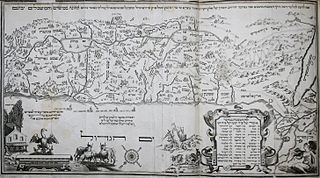
According to the Hebrew Bible, the Tribe of Manasseh was one of the Tribes of Israel. It is one of the ten lost tribes. Together with the Tribe of Ephraim, Manasseh also formed the House of Joseph.

Hagar is a biblical woman. According to the Book of Genesis, she was an Egyptian slave, a handmaiden of Sarah, whom Sarah gave to her own husband Abram as a wife to bear him a child. Abraham's firstborn son, through Hagar, Ishmael, became the progenitor of the Ishmaelites, generally taken to be the Arabs. Various commentators have connected her to the Hagrites, perhaps claiming her as their eponymous ancestor. Hagar is alluded to, although not named, in the Quran, and Islam considers her Abraham's second wife.

Bashan is the ancient, biblical name used for the northernmost region of the Transjordan during the Iron Age. It is situated in modern-day Syria. Its western part, nowadays known as the Golan Heights, was captured by Israel during the 1967 Six Day War and annexed in 1981.

According to the Torah, the Tribe of Benjamin was one of the Twelve Tribes of Israel. The tribe was descended from Benjamin, the youngest son of the patriarch Jacob and his wife Rachel. In the Samaritan Pentateuch the name appears as Binyamīm.

Jehoash, whose name means "Yahweh has given," was the twelfth king of the ancient northern Kingdom of Israel (Samaria) and the son of Jehoahaz. He was the 12th king of Israel and reigned for 16 years. William F. Albright has dated his reign to 801–786 BC, while E. R. Thiele offers the dates 798–782 BC. When he ascended the throne, the Kingdom of Israel was suffering from the predations of the Arameans, whose king Hazael was conquering land controlled by Israel.
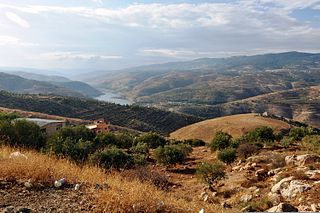
Gilead or Gilad is the ancient, historic, biblical name of the mountainous northern part of the region of Transjordan. The region is bounded in the west by the Jordan River, in the north by the deep ravine of the river Yarmouk and the region of Bashan, and in the southwest by what were known during antiquity as the “plains of Moab”, with no definite boundary to the east. In some cases, “Gilead” is used in the Bible to refer to all the region east of the Jordan River. Gilead is situated in modern-day Jordan, corresponding roughly to the Irbid, Ajloun, Jerash and Balqa Governorates.
Jabesh-Gilead, sometimes shortened to Jabesh, was an ancient Israelite town in Gilead, in northwest Jordan. Jabesh is mentioned several times in the Hebrew Bible primarily in connection with King Saul battles against the Ammonites and Philistines
The Psalms of Asaph are the twelve psalms numbered as 50 and 73–83 in the Masoretic Text, and as 49 and 72–82 in the Septuagint. They are located in the Book of Psalms in the Hebrew Bible. Scholars have determined that a psalm's attribution to Asaph can mean a variety of things. It could mean that the psalms were a part of a collection from the Asaphites, a name commonly used to identify temple singers. Another possibility is that the psalms were performed in the style or tradition of the guild bearing Asaph's name. Asaph is said to either be the author or the transcriber of these psalms. He may not have said these psalms but transcribed the words of David. No specific time period is known to be associated with these Psalms, but the record of destruction noted in Psalm 74 may indicate that these Psalms came from the post-exilic period.

Psalm 83 is the 83rd psalm of the biblical Book of Psalms. In the slightly different numbering system used in the Greek Septuagint and Latin Vulgate translations of the Bible, this psalm is Psalm 82.

Transjordan is an area of land in the Southern Levant lying east of the Jordan River valley. It is also alternatively called Gilead.
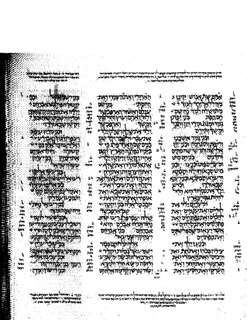
1 Chronicles 5 is the fifth chapter of the Books of Chronicles in the Hebrew Bible or the First Book of Chronicles in the Old Testament of the Christian Bible. The book is compiled from older sources by an unknown person or group, designated by modern scholars as "the Chronicler", and had the final shape established in late fifth or fourth century BCE. This chapter focuses on the Transjordanian tribes, geographically from south to north: Reuben, Gad and the half tribe of Manasseh, as well as the account of the war against the Hagrites and the reasoning why Transjordanian tribes were taken away into exile. It belongs to the section focusing on the list of genealogies from Adam to the lists of the people returning from exile in Babylon.
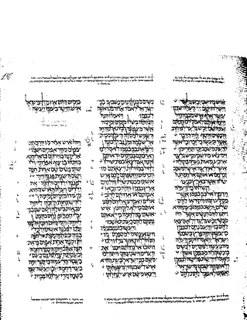
1 Samuel 11 is the eleventh chapter of the First Book of Samuel in the Old Testament of the Christian Bible or the first part of the Books of Samuel in the Hebrew Bible. According to Jewish tradition the book was attributed to the prophet Samuel, with additions by the prophets Gad and Nathan, but modern scholars view it as a composition of a number of independent texts of various ages from c. 630–540 BCE. This chapter describes Saul obliterating the army of Nahash king of Ammon and liberating Jabesh-Gilead, thereby convincing the people about his ability to lead, and causing them to appoint him king. This is within a section comprising 1 Samuel 7–15 which records the rise of the monarchy in Israel and the account of the first years of King Saul.

Warfare in the Hebrew Bible concerns any military engagement narrated or discussed in the Hebrew Bible, also known as the Tanakh or Old Testament of the Bible. Texts about warfare in the Hebrew Bible are part of the broader topic of The Bible and violence. They cover a wide range of topics from detailed battle reports including weapons and tactics used, numbers of combatants involved, and casualties experienced, to discussions of motives and justifications for war, the sacred and secular aspects of warfare, descriptions and considerations of what in modern times would be considered war crimes such as genocide or wartime sexual violence, and reflections on wars that have happened, or predictions, visions or imaginations of wars that are yet to come.
References
- ↑ For "sons of Agar," see Baruch 3:23, Revised Version. For Agarenes see Baruch 3:23, King James Bible.
- 1 2 Theodor Nöldeke (1899). "Hagar". In T. K. Cheyne; J. Sutherland Black (eds.). Encyclopaedia Biblica: A Critical Dictionary of the Literary, Political, and Religious History, the Archaeology, Geography, and Natural History of the Bible. Vol. 2, E–K. New York: The Macmillan Company.